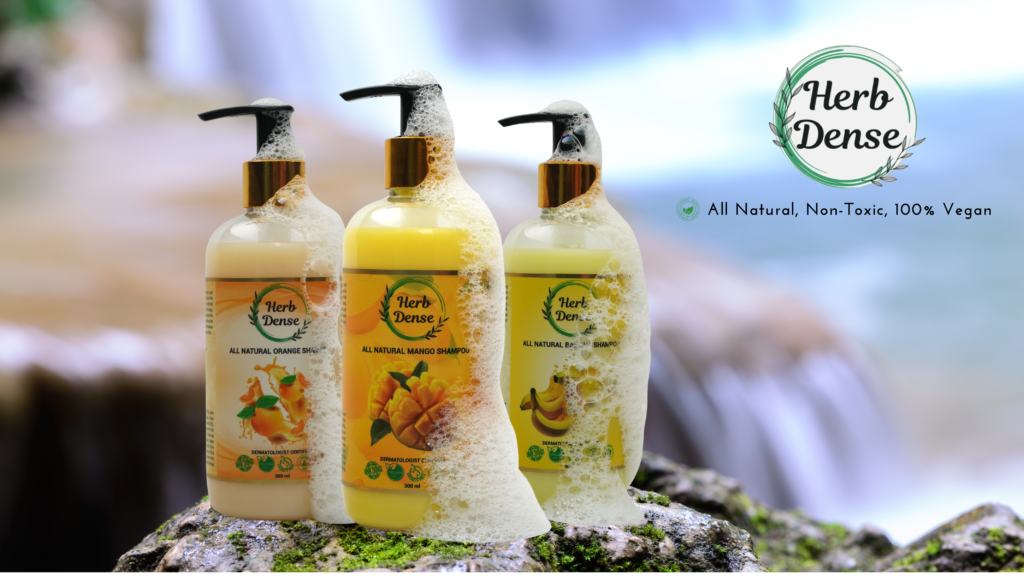In a world increasingly focused on sustainability and eco-conscious living, every aspect of our lifestyle is being reexamined, including our beauty routines. One area gaining significant attention is hair care, particularly the shift from chemical-laden shampoos to herbal alternatives. Herbal shampoos are not just a trend; they represent a holistic approach to hair care that aligns with the principles of environmental responsibility and personal health. Here’s how herbal shampoos support a greener beauty routine.
1. Eco-Friendly Ingredients
Herbal shampoos are formulated with natural, plant-based ingredients like aloe vera, hibiscus, neem, and chamomile. Unlike synthetic shampoos that often rely on harsh chemicals like sulfates, parabens, and silicones, herbal shampoos use biodegradable components that do not harm the environment. When washed down the drain, these shampoos break down naturally, reducing water pollution and protecting aquatic ecosystems.
For instance, conventional shampoos often contain sulfates, which create foamy lathers but can harm marine life and disrupt water systems. On the other hand, herbal shampoos use mild, naturally derived surfactants, which are gentle on hair and the environment. By opting for these natural formulations, consumers reduce their ecological footprint and support a cleaner planet.
2. Biodegradable Packaging
Many brands that produce herbal shampoos take a holistic approach to sustainability, extending their green initiatives to packaging. Plastic pollution is a significant global issue, with the beauty industry contributing millions of tons of plastic waste annually. Herbal shampoo brands often use biodegradable, recyclable, or reusable packaging, helping to mitigate this problem.
Some companies go a step further by offering shampoo bars, which eliminate the need for plastic bottles entirely. These solid formulations are not only plastic-free but also compact, reducing transportation emissions. Supporting brands with eco-friendly packaging reinforces a commitment to sustainable beauty practices.
3. Reduced Toxic Exposure
Conventional shampoos often include synthetic fragrances, preservatives, and dyes that can irritate the skin and harm the hair over time. Herbal shampoos, in contrast, are crafted with natural essential oils, plant extracts, and other botanical components that nourish the hair and scalp without the use of harmful chemicals. Ingredients like tea tree oil provide antibacterial properties, while aloe vera soothes the scalp and adds hydration.
By choosing herbal shampoos, users reduce their exposure to toxins, ensuring their personal health is not compromised for beauty. This also minimizes the release of harmful substances into the environment, as fewer synthetic chemicals are produced and used.
4. Sustainable Sourcing
Many herbal shampoo brands prioritize sustainably sourced ingredients, ensuring that the plants and herbs used in their formulations are harvested responsibly. This not only protects biodiversity but also supports ethical farming practices that benefit local communities.
For example, some brands work with fair-trade suppliers to source ingredients like argan oil or shea butter, ensuring that workers are fairly compensated and natural habitats are preserved. Sustainable sourcing is a critical component of green beauty, and herbal shampoos are leading the way in demonstrating how to balance human needs with environmental stewardship.
5. Minimal Carbon Footprint
Producing herbal shampoos generally requires less energy compared to manufacturing synthetic shampoos, which involve chemical synthesis and extensive industrial processes. Plant-based ingredients are often processed using simpler, more sustainable methods, such as cold pressing or steam distillation.
Additionally, many herbal shampoos are produced by small-scale, local businesses that focus on handmade or minimally processed products. Supporting such brands reduces the carbon footprint associated with mass production and long-distance shipping, further contributing to a greener beauty routine.
6. Promotes Conscious Consumerism
The choice to use herbal shampoos encourages a mindset of conscious consumerism. It prompts individuals to think critically about what goes into their beauty products, how those products are made, and their impact on the planet. By choosing herbal shampoos, consumers align their values with their purchasing decisions, promoting sustainability within the beauty industry.
Conscious consumerism also drives demand for eco-friendly products, pushing more companies to adopt greener practices. The shift towards herbal shampoos is not just about individual choices; it’s a movement that influences the broader beauty industry to prioritize sustainability.
7. Benefits for Hair and Scalp Health
Herbal shampoos are known for their gentle yet effective cleansing properties. Unlike harsh chemical shampoos that can strip natural oils and damage hair, herbal alternatives nourish and protect. Ingredients like neem and tea tree are excellent for combating dandruff, while hibiscus and bhringraj are celebrated for promoting hair growth and strengthening roots.
This focus on health and wellness resonates with the growing preference for natural solutions over synthetic ones. When consumers experience the benefits of herbal shampoos firsthand, they are more likely to commit to a greener beauty routine.
8. Advocacy for a Circular Economy
Some herbal shampoo brands actively promote a circular economy by encouraging recycling and reuse. Programs like refill stations, where customers can bring their own containers to purchase products, are becoming increasingly popular. These initiatives reduce packaging waste and foster a sense of community and environmental responsibility.
Circular economy principles align seamlessly with the ethos of herbal shampoos, emphasizing resource efficiency and waste reduction. By participating in such systems, consumers contribute to a sustainable future.
Conclusion
The shift towards herbal shampoos represents more than a beauty trend; it’s a conscious effort to prioritize sustainability, health, and environmental care. By embracing natural, eco-friendly ingredients, sustainable sourcing, and biodegradable packaging, herbal shampoos support a greener beauty routine in every sense. They not only benefit the planet but also promote healthier hair and scalp, making them a win-win solution.
As consumers, the power to drive change lies in our choices. By choosing herbal shampoos, we signal to the beauty industry that sustainability is not optional—it’s essential. Together, these small, individual decisions have the potential to create a ripple effect, transforming beauty routines into acts of environmental stewardship

